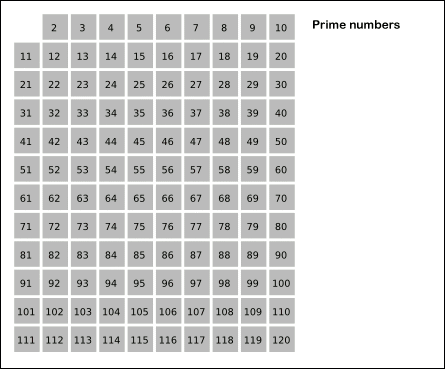Prime numbers with Eratosthenes sieve¶
Sieve of Eratosthenes is an ancien greek algorithm for finding all prime numbers up to any given limit.
A prime number is natural number that has exactly two distinct natural numbers divisors; the number 1 and itself.
The first prime numbers are
$$ 2,3,5,7,11,13,17,19,23,29,31,37,41,43,47,53,59,61,67,71,73,79,83,89,97,101,103,107,109,113 $$
Solution¶
To find all the prime numbers less than or equal to a given integer $n$ by Eratosthenes' method:
- Create a list of consecutive integers from $2$ through $n$: $(2, 3, 4, ..., n)$.
- Initially, let $p$ equal 2, the smallest prime number.
- Enumerate the multiples of $p$ by counting in increments of $p$ from $2p$ to $n$, and mark them in the list (these will be $2p, 3p, 4p, ...;$ the $p$ itself should not be marked).
- Find the smallest number in the list greater than $p$ that is not marked. If there was no such number, stop. Otherwise, let $p$ now equal this new number (which is the next prime), and repeat from step 3.
- When the algorithm terminates, the numbers remaining not marked in the list are all the primes below $n$.
Imports¶
In [1]:
Copied!
import numpy as np
import numpy as np
Algorithm¶
In [10]:
Copied!
def seive_of_eratosthenes(n: int = 2):
"""Algorithm to get all Prime numbers up to the value n
Args:
n (int, optional): End number for the prime calculations. Defaults to 2.
Returns:
list: list of all primenumber upto n
"""
# create empty array
_is_prime = [True for i in range(n + 1)]
# 0 and 1 are not primes
_is_prime[0] = _is_prime[1] = False
p = 2
while (p * p <= n):
# If prime[p] is not changed, then it is a prime
if (_is_prime[p] == True):
# Update all multiples of p
for i in range(p ** 2, n + 1, p):
_is_prime[i] = False
p += 1
return _is_prime
def print_primenumbers(is_prime: list):
"""Print all prime numbers indicated on a boolean list
Args:
is_prime (list): list of boolean indicating of the number is a prime
"""
print("Following are the prime numbers smaller than {}".format(len(is_prime)))
for p in range(len(is_prime)):
if is_prime[p]:
print(p, end=' ')
def seive_of_eratosthenes(n: int = 2):
"""Algorithm to get all Prime numbers up to the value n
Args:
n (int, optional): End number for the prime calculations. Defaults to 2.
Returns:
list: list of all primenumber upto n
"""
# create empty array
_is_prime = [True for i in range(n + 1)]
# 0 and 1 are not primes
_is_prime[0] = _is_prime[1] = False
p = 2
while (p * p <= n):
# If prime[p] is not changed, then it is a prime
if (_is_prime[p] == True):
# Update all multiples of p
for i in range(p ** 2, n + 1, p):
_is_prime[i] = False
p += 1
return _is_prime
def print_primenumbers(is_prime: list):
"""Print all prime numbers indicated on a boolean list
Args:
is_prime (list): list of boolean indicating of the number is a prime
"""
print("Following are the prime numbers smaller than {}".format(len(is_prime)))
for p in range(len(is_prime)):
if is_prime[p]:
print(p, end=' ')
Test¶
In [13]:
Copied!
is_prime = seive_of_eratosthenes(120)
print_primenumbers(is_prime)
is_prime = seive_of_eratosthenes(120)
print_primenumbers(is_prime)
Following are the prime numbers smaller than 121 2 3 5 7 11 13 17 19 23 29 31 37 41 43 47 53 59 61 67 71 73 79 83 89 97 101 103 107 109 113
